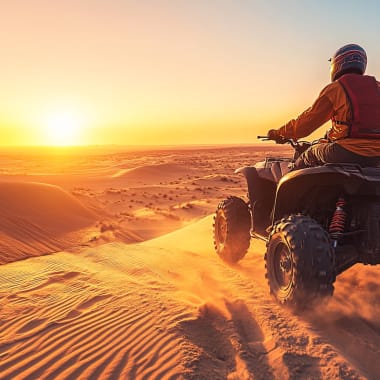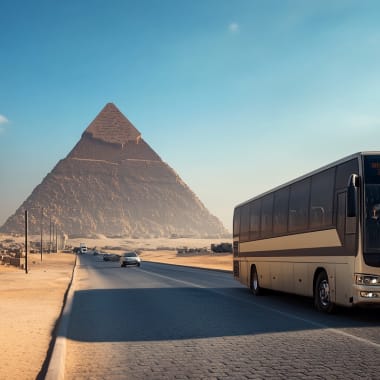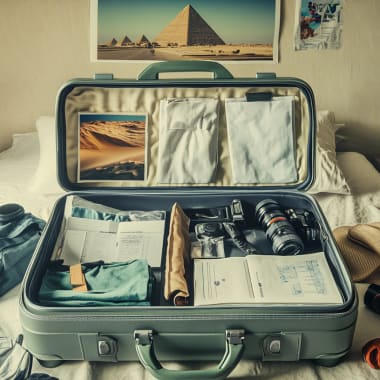
Safety tips for Egypt
How to travel Egypt individually, safely, and with respect for the culture – with practical tips and current recommendations.
How to travel Egypt individually, safely, and with respect for the culture – with practical tips and current recommendations.
Egypt has fascinated for centuries with its rich history, vibrant culture, and impressive landscapes – and still belongs to the most popular travel destinations worldwide. More and more people are discovering the country on their own: The trend towards individual travel is increasing, supported by a well-developed tourist infrastructure and a growing digital information offering. Those who move away from classic group travel often look for authentic experiences – while simultaneously facing their own challenges, especially regarding safety.
Many individual travelers report positive experiences and a high sense of safety in the well-known tourist centers such as Cairo, Luxor, or Hurghada. Nevertheless, a trip through Egypt requires attention, preparation, and knowledge of regional differences. Safety tips help not only to minimize risks but also shape the overall travel experience: They determine which places to visit, how spontaneous one can be on the go – and to what extent cultural encounters are truly possible.
In this article, we provide you with an overview of the current security situation in Egypt, show which regions are considered safe, and give specific behavioral guidelines for a carefree and respectful stay. Because being well informed not only means traveling more safely – but also more intensely and authentically.
Current security situation and travel warnings
What individual travelers should know about regional differences
The security situation in Egypt is stable overall, according to official sources such as the Foreign Office, the BMEIA, and the Swiss representation – especially in the tourist-heavy areas like Cairo, Luxor, Aswan, or the resorts along the Red Sea. These regions are considered well-travelable with appropriate caution. At the same time, a still-existing risk of terrorist attacks is pointed out, particularly in certain parts of the country, such as northern Sinai or the border regions with Libya, Sudan, and the Gaza Strip.
The situation is particularly critical in the North Sinai Governorate, where a partial travel warning exists due to repeated attacks, active military operations, and a prolonged state of emergency. The border area with the Gaza Strip and the Egyptian-Israeli border area – with the exception of the direct coastal section near Taba – are also considered high-risk zones. Travel to these regions is strongly discouraged. Even in southern Sinai, which is touristically shaped, authorities advise increased vigilance, especially during overland journeys or excursions off established routes.
Reliable sources for security information
Those traveling as individual travelers in Egypt should regularly inform themselves about the current security situation. Reliable information is provided by the official websites of the Foreign Office, the respective embassies, as well as the Austrian and Swiss foreign ministries. Here you will find current warning levels, recommendations for individual regions, and concrete behavior tips. Organizations such as the WHO or the UN also provide supplementary assessments, especially regarding health risks and regional crisis developments.
Our tip: Subscribe to the travel and safety information from your foreign ministry via email or app before you travel. This way, you will stay informed on the go – and can flexibly adjust your travel route if necessary. A conscious approach to this information not only increases your safety but also enhances the quality of your travel experience.
Safe and unsafe regions
Where individual travelers can travel safely – and which areas they should better avoid
The security situation in Egypt varies significantly by region – while many tourist centers are well protected and easy to travel, there are other regions that, according to official authorities, should be avoided. Therefore, it is crucial for individual travelers to know where carefree exploration is possible and where increased caution is advised.
Regions that are particularly safe to travel include the touristically well-developed areas: These include the metropolis of Cairo with the world-famous pyramids of Giza, the historical cities of Luxor and Aswan in the south, as well as the popular resorts along the Red Sea like Hurghada and Sharm el-Sheikh. The border town of Taba on the coast is also considered a safe exception in the Egyptian-Israeli border area. In all these regions, enhanced police presence and strict access controls for tourist facilities are to be expected, which strengthens the sense of security for many travelers. However, it is also important here to be particularly aware of your surroundings in crowded places and on special occasions.
In contrast, the following areas are considered unsafe, for which partial official travel warnings have been issued: The northern Sinai Peninsula (particularly the North Sinai Governorate), the border area with the Gaza Strip, large parts of the Egyptian-Israeli border area (except Taba), as well as the western and southern desert areas along the borders with Libya and Sudan. In these regions, there is an increased risk from militant activities, military confrontations, kidnappings, and terrorist attacks. Travel there is not only dangerous but in many cases also prohibited by the Egyptian authorities.
Also in southern Sinai, where popular places like Dahab, Nuweiba, and parts of Sharm el-Sheikh are located, caution is advised – individual excursions should only be undertaken with a knowledgeable local guide. Nationwide, it applies: Avoid demonstrations, large crowds, and nighttime overland journeys. Stay informed, critically question spontaneous route changes – and always orient yourself in your travel planning based on current indications from official sources.
This way, the cultural treasures of Egypt can be experienced safely and thoughtfully – without taking unnecessary risks.
Behavior in crowds and during activities
Egypt delights with vibrant cities, bustling markets, and fascinating sights – but where many people come together, a conscious approach to the surroundings is particularly important. Those who heed a few basic rules can manage such situations relaxed and enjoy the travel experience to the fullest.
Avoid large crowds, especially on political memorial days or after Friday prayers near mosques. You should also avoid squares in front of government buildings and universities as a precaution. In busy areas such as train stations or bazaars, it pays to keep an eye on your valuables and store larger amounts of cash securely. Those who regularly inform themselves about the current situation – for example, through hotel staff or local media – are well prepared and can respond flexibly.
Guided activities can be excellently organized in Egypt: Whether desert tours, snorkeling trips, or city walks – with an experienced, licensed guide, you not only experience more but also travel more safely. Pay attention to transparent information, good ratings, and small group sizes when choosing. In rural areas, modest clothing is recommended as a sign of respect – this promotes a positive cultural exchange and leaves a good impression.
Interaction with local security forces
The visible presence of police and military in Egypt is a sign of how seriously the country takes the protection of its guests – especially at tourist destinations. The security forces are usually friendly, professional, and keen to ensure a smooth process.
If you are approached or checked, it is sufficient to remain calm, respond politely, and show a copy of your ID if asked. This is usually handled quickly and easily. Open cooperation is appreciated – and ensures that you can feel safe at all times.
A few simple behavioral rules help to avoid misunderstandings: Do not photograph police or military installations, and do not express political opinions publicly. Those who behave respectfully and observe local customs will experience Egypt as a country that greets guests with warmth and great hospitality – even regarding security matters.
Minimizing risks and emergency plans
A successful stay in Egypt begins with thoughtful travel preparation – especially if you want to discover the country individually. While tourist centers are considered relatively safe, it is important to be aware of typical risks and to prepare well for emergencies. With clear risk awareness and the right measures, unpleasant situations can usually be avoided – or quickly managed.
The biggest challenges for individual travelers range from petty crime to attempts at fraud to political unrest. Increased attention is required, especially in busy areas such as train stations, markets, or tourist hotspots. Additionally, navigating local transport can be tricky – app-based ride services like Uber or Careem are generally considered much safer than conventional taxis. Women traveling alone should prefer to use taxis in the evening and avoid remote areas.
In addition to foresight, securing documents is central: Important documents such as passport or insurance policy should not only be stored securely but also saved digitally. Those planning excursions to more remote regions – such as the desert or dive spots – should only do so in the company of licensed, knowledgeable providers.
Communication tools in emergencies
In case of emergencies, quick and targeted action is required – and this only works if you know how and where to get help. Write down the most important emergency numbers in advance, foremost the tourist police (126) and the general emergency number (122). You should also have the address and telephone number of your embassy or consulate at hand – ideally both digitally and in printed form.
Make sure your mobile phone is always charged and equipped with sufficient credit or internet access. In urban areas, the network coverage is usually good – nevertheless, a local SIM card is recommended for reliable reachability. In an emergency, quickly inform the responsible authorities and follow their instructions.
Proven emergency plans
Good preparation pays off when it really matters. With a few simple precautions, you can react quickly and confidently in case of an emergency. This includes creating electronic copies of important documents as well as taking out a travel insurance, which covers medical emergencies and loss of luggage. For families with children, consent forms and special documents should not be missing.
During your travels, maintain regular contact with trusted individuals at home and continuously inform yourself about current safety advice. Should problems arise, promptly contact the tourist police or your embassy – these offices are trained to assist travelers. And last but not least: Trust your gut feeling. If a situation does not feel right, it is usually better to take a step back.
With a clear view of potential risks and a solid emergency plan in your luggage, nothing stands in the way of a safe and intense experience in Egypt.
Behavior recommendations to increase safety
Traveling safely with caution, respect, and daily routines
A safe stay in Egypt begins with conscious behavior in everyday life. Individual travelers who act thoughtfully, respect local customs, and prepare well significantly reduce risks – whether strolling through the streets of Cairo or embarking on excursions in the Nile Valley. Good preparation and a sense of the surroundings are just as important as practical routines in handling valuables, means of transport, or communication with authorities.
In general: Regularly inform yourself about the current security situation, avoid demonstrations and large crowds, and pay special attention to your surroundings in large cities – especially after dark. Preferably use app-based ride services like Uber or Careem, securely store important documents, and avoid flashy jewelry or large amounts of cash. Especially for solo female travelers, it is advisable not to move outside of tourist areas in the evening and to wear modest clothing.
Discreet and respectful behavior
In addition to practical security aspects, cultural sensitivity plays a central role in ensuring a conflict-free trip. Egypt is a community-oriented society shaped by Islamic values – accordingly, misunderstandings can arise if western individuality or directness meets Egyptian politeness and reserve.
Respectful behavior starts with small gestures: Modest clothing, especially in rural areas, is appreciated just as much as a polite tone and sensitivity in conversation. Avoid loud political discussions, public displays of affection, or photographing security forces – such behaviors can quickly be perceived as inappropriate. Egyptian hospitality should not be underestimated either: Those who decline invitations for tea or small gestures out of courtesy may easily be seen as unfriendly.
With a conscious, culturally sensitive demeanor, you not only contribute to your own safety – you also open doors for authentic encounters that make a trip to Egypt especially memorable.
Experiences of other travelers
What individual travelers report about safety in Egypt
Those embarking on a journey to Egypt as individual travelers want to experience the country as authentically as possible – and rely not only on official advice but also on personal experiences of other travelers. The good news: Most visitors report an overall safe travel experience, especially in the classic tourist centers such as Cairo, Luxor, Aswan, or the resorts along the Red Sea. There, a high police presence, regular security checks, and well-developed tourist structures provide a strong sense of security.
Many individual travelers praise the hospitality of the people and find encounters on-site to be warm and open – especially when they are respectful and reserved. At the same time, experience reports show that mindfulness is required: Pushy vendors, overpriced taxi rides, or minor attempts at fraud, such as in markets, are part of everyday travel in busy areas. Those who negotiate prices in advance, use app-based ride services, and behave discreetly can usually avoid such situations.
Recurring recommendations from travel reports include: Avoid the northern Sinai Peninsula and the border regions with Libya and Gaza, steer clear of large crowds, especially on holidays, and keep your ID documents easily accessible. Many experienced travelers also recommend regularly informing themselves about the current security situation, securely storing important documents, and taking out travel insurance. Those who heed these tips will experience Egypt not only safely – but also with a good sense of the reality on the ground.
Discover the Orient with experts who have explored every corner themselves
Your dream holiday, tailor-made by experts.
We don't just know the Middle East from books, we visit the country several times a year to experience the culture, landscape and people first-hand.
From your first enquiry to your return home, we are there for you personally - by phone, email or WhatsApp, whenever you need us. Our trips are as unique as you are: individually planned and provided with exclusive privileges and high-quality arrangements that will make your trip unforgettable.
Experts for your Orient trip







